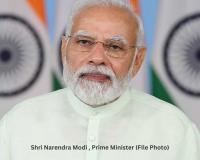PM Modi Urges De-escalation in Call with Iranian President Amid Rising Tensions

New Delhi, 22 June – Prime Minister Narendra Modi held a telephonic conversation with Iranian President Masoud Pezeshkian on Sunday, expressing deep concern over the ongoing conflict between Iran and Israel and appealing for immediate de-escalation through dialogue and diplomacy. The call came just hours after the United States launched airstrikes on Iran’s key nuclear facilities located in Fordow, Natanz, and Isfahan, signaling a dramatic escalation in the region’s volatility.
As per agency report, the airstrikes by American B-2 bombers marked a significant turn in the Israel-Iran conflict, drawing the US directly into the confrontation. In a statement following the strikes, US President Donald Trump declared that Iran’s principal nuclear sites had been completely destroyed, sparking fears of a broader regional conflict.
Prime Minister Modi, in a social media post, stated that the current situation was discussed in detail during his call with President Pezeshkian. He reiterated India's deep concern over the growing tension and emphasized that peace, stability, and security in the region could only be restored through diplomatic engagement and constructive dialogue.
The developments have prompted global reactions, with several major countries and international groups calling for restraint. Iranian Foreign Minister Abbas Araghchi condemned the US attacks, labeling them a serious violation of the UN Charter, international law, and the Nuclear Non-Proliferation Treaty. He characterized the strikes as deeply unjust and warned of long-term consequences. In a statement, Araghchi said Iran reserves all options to defend its sovereignty and urged United Nations members to be alarmed by what he described as dangerous, illegal, and criminal actions by the United States.
The European Union also voiced concern, urging all involved parties to return to negotiations. EU High Representative for Foreign Affairs and Security Policy, Kaja Kallas, appealed for calm and emphasized the need to prevent further escalation. The foreign ministers of EU member states are scheduled to meet on Monday to assess the evolving situation.
Meanwhile, the United Kingdom and several other countries have echoed similar calls for peace and dialogue. However, China and Russia have yet to issue official statements on the US airstrikes and the resulting geopolitical ramifications. The situation remains tense as the international community watches closely for the next developments in this rapidly unfolding crisis.






